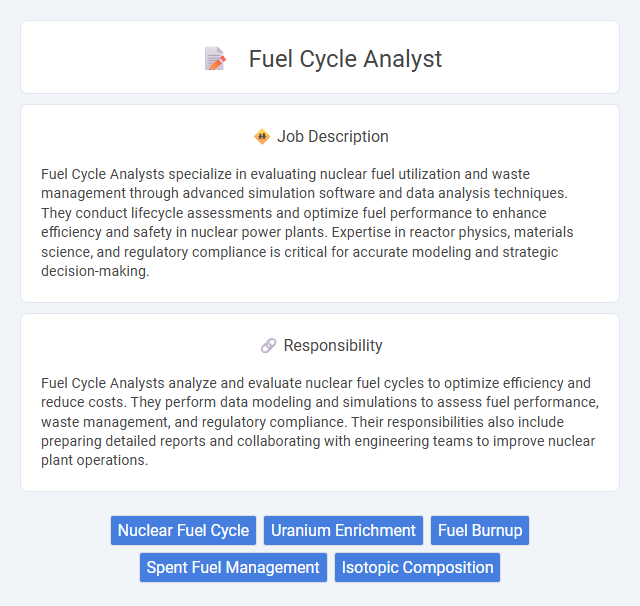
Fuel Cycle Analysts specialize in evaluating nuclear fuel utilization and waste management through advanced simulation software and data analysis techniques. They conduct lifecycle assessments and optimize fuel performance to enhance efficiency and safety in nuclear power plants. Expertise in reactor physics, materials science, and regulatory compliance is critical for accurate modeling and strategic decision-making.
Individuals with strong analytical skills and a background in nuclear science or engineering are likely to be well-suited for a Fuel Cycle Analyst role. Those who enjoy complex problem-solving and have an aptitude for interpreting technical data may find the work engaging and fulfilling. Candidates who prefer routine tasks or lack attention to detail might face challenges in adapting to the dynamic nature of fuel cycle analysis.
Qualification
Expertise in nuclear engineering and fuel cycle analysis is essential for a Fuel Cycle Analyst, with a strong background in reactor physics, radiological safety, and nuclear materials management. Proficiency in simulation software such as SCALE, MCNP, or SERPENT, combined with advanced skills in data analysis and modeling, enhances the ability to evaluate fuel performance and optimize fuel cycle strategies. A minimum of a bachelor's degree in nuclear engineering, physics, or a related discipline, supplemented by experience in regulatory frameworks and nuclear fuel management practices, is critical for success in this role.
Responsibility
Fuel Cycle Analysts analyze and evaluate nuclear fuel cycles to optimize efficiency and reduce costs. They perform data modeling and simulations to assess fuel performance, waste management, and regulatory compliance. Their responsibilities also include preparing detailed reports and collaborating with engineering teams to improve nuclear plant operations.
Benefit
Fuel Cycle Analyst roles likely offer significant benefits including the opportunity to influence sustainable energy practices and optimize nuclear fuel management. Professionals in this position probably gain exposure to advanced analytical tools and nuclear science, enhancing career growth prospects in the energy sector. The role may also provide competitive compensation and contribute to environmental safety through efficient fuel cycle strategies.
Challenge
Fuel Cycle Analyst roles likely involve complex challenges related to optimizing nuclear fuel usage and waste management. Professionals in this position probably face significant difficulties in balancing efficiency, safety, and regulatory compliance within evolving energy policies. The complexity of modeling nuclear fuel behavior and predicting long-term environmental impacts suggests continuous problem-solving under uncertain conditions.
Career Advancement
Fuel Cycle Analyst roles offer significant career advancement opportunities through specialization in nuclear fuel management, reactor operations, and regulatory compliance. Progression often involves moving into senior analyst positions, project leadership roles, or consultancy within the nuclear energy sector. Expertise in fuel cycle simulation software and data analysis enhances prospects for strategic roles driving efficiency and innovation in nuclear fuel utilization.
Key Terms
Nuclear Fuel Cycle
A Fuel Cycle Analyst specializes in evaluating nuclear fuel processes, including uranium mining, enrichment, fabrication, reactor operation, and spent fuel management. Their expertise includes analyzing fuel utilization, waste minimization, and proliferation risks to optimize reactor performance and sustainability. Proficiency in nuclear regulations, fuel cycle simulation software, and economic assessment is critical for effective decision-making in nuclear fuel cycle management.
Uranium Enrichment
Fuel Cycle Analysts specializing in Uranium Enrichment evaluate processes that increase the concentration of U-235 isotopes in uranium, optimizing nuclear fuel production for reactors. Their work involves analyzing data on centrifuge technology, enrichment levels, and regulatory compliance to ensure efficient and safe fuel fabrication. Proficiency in nuclear fuel cycle modeling and enrichment assay techniques is critical for enhancing resource utilization and minimizing proliferation risks.
Fuel Burnup
A Fuel Cycle Analyst specializes in evaluating nuclear fuel performance, with a focus on fuel burnup to maximize efficiency and safety in reactor operations. This role involves analyzing complex data on fuel irradiation and depletion to optimize fuel utilization while minimizing waste generation. Expertise in nuclear engineering software and regulatory compliance is essential to support sustainable fuel cycle management.
Spent Fuel Management
Fuel Cycle Analysts specializing in Spent Fuel Management evaluate the storage, transportation, and disposal of used nuclear fuel to ensure safety and regulatory compliance. They analyze data on radioactive decay, thermal output, and radiological hazards to optimize fuel handling strategies and minimize environmental impact. Proficiency in nuclear fuel cycle simulation tools and knowledge of regulations such as NRC and IAEA guidelines are essential for effective spent fuel management.
Isotopic Composition
A Fuel Cycle Analyst specializing in isotopic composition evaluates nuclear fuel materials to determine the distribution and concentration of isotopes throughout different stages of the fuel cycle. This role involves analyzing isotopic data to optimize fuel utilization, assess reactor performance, and ensure compliance with safety and regulatory standards. Proficiency in nuclear chemistry, computational modeling, and data interpretation is crucial for predicting isotopic behavior and enhancing fuel cycle efficiency.
 kuljobs.com
kuljobs.com